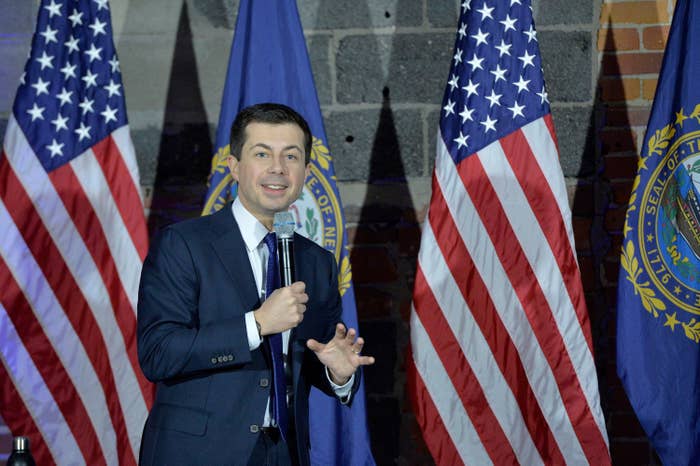
MANCHESTER, New Hampshire — Last night in Iowa, Pete Buttigieg declared victory in the nation’s first caucuses, a race on whose results he had built the entirety of his unlikely presidential campaign.
This morning, in New Hampshire, Buttigieg did not mention it. In fact, he didn’t say the word “Iowa” when he took the stage here.
It was as if it hadn’t happened. Because — well, no one was really sure what had happened.
“I’m so glad to be with you this morning,” Buttigieg said to the crowd in New Hampshire. “I think it’s morning. I took a little nap somewhere in between sundown and sunup.”
It was a surreal scene Tuesday, the day after a technological debacle delayed the results in Iowa — a state where the Democratic presidential hopeful sank tens of millions of dollars, countless hours, and sky-high hopes. In the past, candidates have arrived in New Hampshire in the early hours of the morning after the Iowa caucuses with a narrative: victory, momentum, potential, failure.
So far, there’s only been confusion. The Iowa Democratic Party has only said that it hopes to release a majority of the results later on Tuesday.
But even those results may not produce a clear winner: The complex caucus system in Iowa means that one candidate, like Bernie Sanders, could pull in more votes, but another could end up with more state delegate equivalents, and the mess of Monday night does not help. Traditionally, the candidate with the most state delegate equivalents is declared the winner in Iowa — but the party agreed for the first time to release raw vote totals, muddying the results even further.
Around midnight after the caucuses, Buttigieg declared victory in Des Moines, releasing a set of numbers that he said proved he would win the caucuses.
“So we don’t know all the results,” Buttigieg said. “But we know, by the time it’s all said and done: Iowa, you have shocked the nation. Because, by all indications, we are going on to New Hampshire victorious.”
But Sanders’ campaign had suggested they were pretty sure that he had won and produced its own numbers. And Buttigieg later seemed to backtrack, noting the lack of official results in a TV interview and saying he considered any result in Iowa a victory.
Elizabeth Warren, who by many counts seemed to have come in third in the state, was simply calling the results “too close to call” — while her campaign took shots at Joe Biden, who it declared had finished in “a distant fourth.” Some Biden allies seemed to imply that they didn’t trust the results at all.
The Iowa caucuses had already come under criticism before last night’s mess. The system is complicated: Voters have to remain in a caucus site, sometimes for hours, as they align themselves with candidates, redistributing themselves if their preferred candidate doesn’t earn enough votes.
New Hampshire has a different system: a primary, where voters simply cast their ballots for their first-choice candidate. Voters at Buttigieg’s event expressed confusion and anxiety at what had just happened in Iowa — it had the potential, they thought, to undermine faith not just in the caucus system but in voting as a whole.
“This will be a bullet for Trump,” said Kim, a Manchester resident who has a disability and had worked as a pharmacist, of the Iowa chaos.
Scott Antonucci, a retired construction industry employee in Manchester who came to see Buttigieg, said he was deciding between the former South Bend mayor and Warren, though he was also considering former New York City mayor Mike Bloomberg.
Asked if it would influence his vote if Buttigieg beat Warren in Iowa, Antonucci said, “Yes. It would.”
Why?
“Good question,” he said. “Huh, good question.” He didn’t have an answer.

